The IFA 2014 tradeshow in Berlin probably held you attention this week, because this was the place to be for those interested in being up to date with the latest gadgets.
However, while being on the grounds at the event, we noticed a trend. It appears this year, brand vendors focused on bringing forth smartphones, phablets and 2-in-1 notebook convertibles rather than tablets. But why is that?
But before we try and answer this question, we’re going to take a little tour and give you a few example of handheld products that just saw the light of day.
One of the biggest tablet vendors in the world, Samsung was present at IFA but their presentation didn’t focus on slates at all.
Samsung was busy launching its flagship Galaxy Note 4, a premium version of last year’s Galaxy phablet, but also the Galaxy Note Edge, which is basically quite similar to the Note 4, but comes with a uniquely folded display. The tech giant also showed its latest, curved Gear S smartwatch and VR set.
Nokia/Microsoft had some mid-range smartphones to show, in the form of the Lumia 720 and 80, which will certainly appeal to a lot of users as they bring about capable feats in the photography department (the 730 is actually a selfie-phone).
HTC launched its seconds 64-bit smartphone, which is the successor of the Desire 816 phablet, the HTC Desire 820 (available in dual SIM version too), while Huawei promoted its flagship phablet, the Ascent Mate7 which comes with a 6-inch 1080p screen.
Even the world’s biggest PC vendor, Lenovo came equipped with an interesting smartphone, the Vibe X2 dubbed “the first layered smartphone” which translates into the body being made of distinct colorful layers.
While things were being kept hot and steamy in the smartphone department with lots of flagship products to choose from, the tablet garden was quite deserted this year at IFA.
The only notable presence was the brand new Sony Xperia Z3 Tablet Compact, which is a shrunken down version of the company’s waterproof flagship the Xperia Z2.
But for some reason the new tablet doesn’t bring any big updates in terms of specs. For starters, Sony doesn’t seem to be interested in the Snapdragon 805 chipset, so it will continue to use the Snapdragon 801 platform for its devices of fall 2014.
However, compared to the Xperia Z2, the MSM8974AC variant residing at its core has been clocked at a higher rate. What makes the tab special is that it comes with integrated Play Station support, which is something you won't see everywhere.
Anyway, apart from Sony, other brand vendors seem to have forgotten about the notion of flagship tablets coming with innovative hardware and amazing specs.
Samsung, for example took one of its lesser tablets applied some rugged features on top and released it as the Galaxy Tab 4 Active, hoping to capitalize on the original design some more. But the device is quite boring in itself
Other important names in the industry seem to be aiming for the budget sector instead. For example, Toshiba introduced the Encore Mini with Windows 8.1 with Bing which sells for a ridiculous rate. Lenovo also launched a device with decent specs and affordable price-tag, but there’s nothing too exciting about it. The statement also applied to ASUS.
Before you say anything, we are aware that some new 2-in-1 hybrid tablet/notebooks have been launched during the trade show, coming equipped with the first chips arriving under the Broadwell banner (namely Core-M), which make them quite interesting products.
However, we want to place these devices in a distinct category of their own. Apparently these models are starting to appeal to customers more, due to offering the option of getting more productive because they come with a keyboard.
So what is happening? Are brand vendors noticing an increasing lack of interest on behalf of customers for premium devices such as the recently unveiled Samsung Galaxy Tab S with AMOLED display? That could very well be the case and that’s why they are choosing to focus their efforts somewhere else.
After all a few months ago, research firm IDC warned that tablet fatigue was setting over the market. They argued this was happening because consumers have a tendency to hold on to their tablet, especially the higher-cost models, for longer than previously anticipated.
And when they finally decide to make the move, they pass on the tablet to a member of the family.
The second factor is phablets, which are increasingly causing customers to second-guess tablet purchases, because the large screen on these phones are often good enough for tasks that were once reserved for tablets.
Keeping this information in mind, it’s no wonder why companies like Samsung, HTC or Huwaei choose to focus on phablets this year's IFA 2014.

 14 DAY TRIAL //
14 DAY TRIAL //